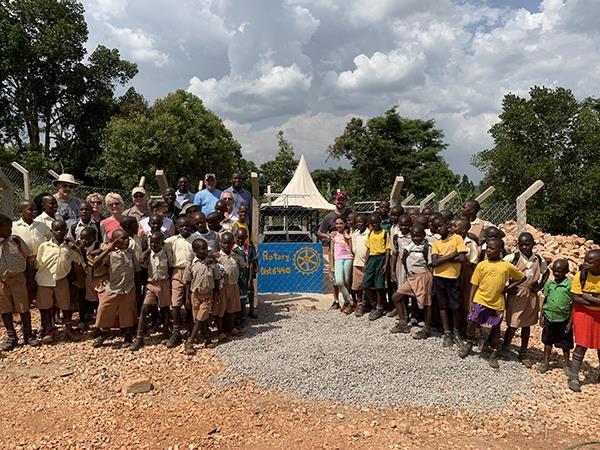 This past January, Rotarians from the Rotary Club of Arlington Heights , Chicago near South, and Lake in the Hills had the opportunity to volunteer for two of our areas of focus: Water and Sanitation and Economic and Community Development. The team of 13 headed to Bunnamweri, Uganda to build and install six Aquaponics tanks at the Saint Raphael School. The idea for this project started 8 years ago on another service trip to Guatemala where the same tanks were installed.
This past January, Rotarians from the Rotary Club of Arlington Heights , Chicago near South, and Lake in the Hills had the opportunity to volunteer for two of our areas of focus: Water and Sanitation and Economic and Community Development. The team of 13 headed to Bunnamweri, Uganda to build and install six Aquaponics tanks at the Saint Raphael School. The idea for this project started 8 years ago on another service trip to Guatemala where the same tanks were installed.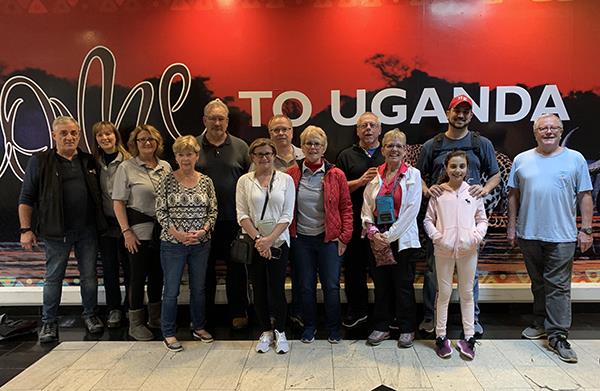 Rotary’s purpose is to provide humanitarian service with the goal of advancing goodwill and peace around the world. We achieve this through our six areas of focus: Peace and Conflict Prevention/Resolution, Disease Prevention and Treatment, Water and Sanitation, Maternal and Child Health, Basic Education and Literacy, and Economic and Community Development. This past January, Rotarians from the Rotary Club of Arlington Heights , Chicago near South, and Lake in the Hills had the opportunity to volunteer for two of our areas of focus: Water and Sanitation and Economic and Community Development. The team of 13 headed to Bunnamweri, Uganda to build and install six Aquaponics tanks at the Saint Raphael School. The idea for this project started 8 years ago on another service trip to Guatemala where the same tanks were installed.
Rotary’s purpose is to provide humanitarian service with the goal of advancing goodwill and peace around the world. We achieve this through our six areas of focus: Peace and Conflict Prevention/Resolution, Disease Prevention and Treatment, Water and Sanitation, Maternal and Child Health, Basic Education and Literacy, and Economic and Community Development. This past January, Rotarians from the Rotary Club of Arlington Heights , Chicago near South, and Lake in the Hills had the opportunity to volunteer for two of our areas of focus: Water and Sanitation and Economic and Community Development. The team of 13 headed to Bunnamweri, Uganda to build and install six Aquaponics tanks at the Saint Raphael School. The idea for this project started 8 years ago on another service trip to Guatemala where the same tanks were installed.The primary goal of this project is to provide a sustainable source of protein for the students of St. Raphael and their families. However, once it is up and running it will serve as a model for smaller units that can be built by locals where they can grow their own fish to harvest, eat, and sell. A curriculum is currently being written to be shared with local villagers. To make this possible, microfinancing is being set up to help families get their tanks started. The program will begin a year from now once the first batches of Tilapia are harvested. This generous gift is being provided by individual members of Stepping Stones Foundation of Hope, Knights of Columbus, and the Holy Family Association.
In March 2018, Jim Wales, International Service Advisor for Rotary District 6440, was contacted by Matt Schultz. Matt was part of the team that went to Guatemala 8 years ago. He returned from visiting the school in Uganda in January of 2018, and knew that Saint Raphael School could use something similar. The two then reached out to Dennis Kasule, a priest that teaches at Mundelein Seminary who started the Saint Raphael School in Uganda: soon after the idea for the trip became a reality.
When the Rotary volunteers arrived at the Saint Raphael School on January 27th, the school children welcomed them with a meal and a dance. Betsy Kmiecik, of the Rotary Club of Arlington Heights shared, “They were amazing, sweet and beautiful children. They fed us a meal, buffet style, and when we asked the people who were serving what it was, they weren’t able to explain.”
The volunteers were more ready than ever to start the project: one that would allow the community to improve their quality of life for the long run.
Every day the volunteers had a 45-minute commute to the work site which gave them an opportunity to witness how the Bunnamweri locals lived their lives. Betsy shared, “Watching people commute was fascinating. Their primary vehicles are motor bikes. You would see four adults on one motor bike. The largest number of people I saw on a motorbike was a family of 5. The father driving, a child between his legs, mother in the back and two more kids smashed between them.”
The sides of the road were lined in small commercial businesses, all squeezed together in the open air. The shops offered merchandise varying from clothing, to auto parts, to furniture, and all other kinds of merchandise. There were so many of these small businesses that it made one wonder if anyone was making enough to support themselves and their families.
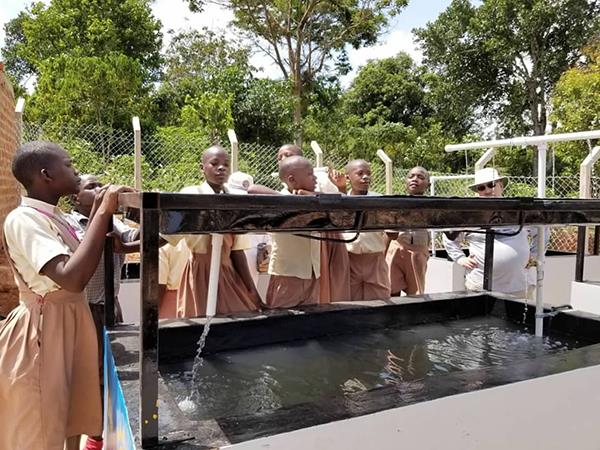
An Aquaponics tank is a closed system created for the purpose of growing and eventually harvesting fish to eat and sell. The goal of building the tanks is to provide the Bunnamweri locals with the protein they lack, as well as a new source of income. In simple terms, these tanks use hydroponics and fish waste to filter the water, so that it can be used to grow the fish and water crops: In Uganda, clean water is a luxury. The fish are living in the bottom tank with grow beds floating above. Fish waste is pumped into the grow beds above creating ammonia: the pump is powered by solar energy. The plants in turn filter the waste and transform the ammonia into nitrate. The nitrate then feeds the plants, but more importantly provides clean filtered water for raising fish and growing vegetables. Thus, the only human attention the system needs is feeding the fish.
Jim Wales shared, “These people have limited access to meat, so the whole idea of building these tanks is to create the ability for kids to have fish (protein) added into their diet. This is a form of fish farming. The goal is that eventually the tanks will be mirrored by local villagers, as a way that they can bring themselves out of poverty”
A new well was dug to function as a water source for the Aquaponics tanks. Water is a scarce resource in undeveloped countries like Uganda. Betsy said, “it was not uncommon to see young children walking a kilometer before school to fill up their jerry cans with cloudy water from a spring.”
The water from this early morning trip would have to be boiled before it could be used, and it would often be the only water a family had available for the day. Rotarians tried lifting the jerry cans the children carried, and were surprised to see they could barely do it themselves.
“They are very strong people, very strong from an early age. They have to be,” said Betsy.
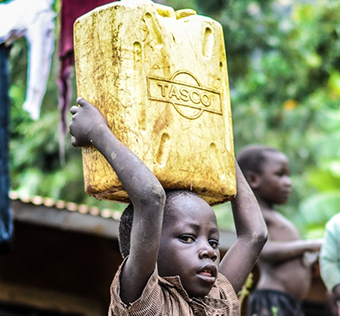 There is no doubt that every person who made this trip a success has had a huge impact on the lives of Bunnamweri families. When it comes to undeveloped countries, the best way one can help is by providing something that can be built upon and is self-sustainable. The volunteers on this trip gave local families a chance to excel and raise their quality of life. We want to thank our Rotarians for giving their time to selflessly provide strangers with a truly life changing gift. However, there is no doubt that our volunteers received a gift in return.
There is no doubt that every person who made this trip a success has had a huge impact on the lives of Bunnamweri families. When it comes to undeveloped countries, the best way one can help is by providing something that can be built upon and is self-sustainable. The volunteers on this trip gave local families a chance to excel and raise their quality of life. We want to thank our Rotarians for giving their time to selflessly provide strangers with a truly life changing gift. However, there is no doubt that our volunteers received a gift in return.Rare experiences like these help Rotarians take a step back and reevaluate what is important in our own lives. They put life in perspective and show us how small some of our problems are.
“We watched the kids play soccer, and that ball was made from banana leaves. It’s amazing what they were able to do with so little. When we would go to the school we always took things for the kids.
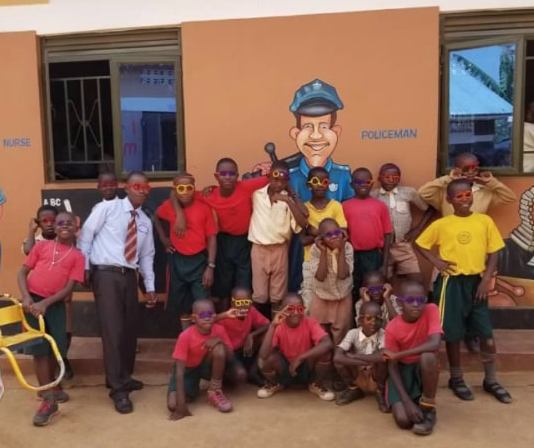 This time was a challenge, we couldn’t take pencils because they have no paper or sidewalk chalk because there are no sidewalks. So, I took pipe cleaners, gave them out, and showed them how they could make things. They loved it! It was amazing. Twenty of the boys made glasses, so we took a group photo. It was great to see how much fun and enjoyment and creativity they got out of them. And the excitement they got from showing off what they made was incredible,” shared Linda Borton, a Rotarian on the trip.
This time was a challenge, we couldn’t take pencils because they have no paper or sidewalk chalk because there are no sidewalks. So, I took pipe cleaners, gave them out, and showed them how they could make things. They loved it! It was amazing. Twenty of the boys made glasses, so we took a group photo. It was great to see how much fun and enjoyment and creativity they got out of them. And the excitement they got from showing off what they made was incredible,” shared Linda Borton, a Rotarian on the trip.